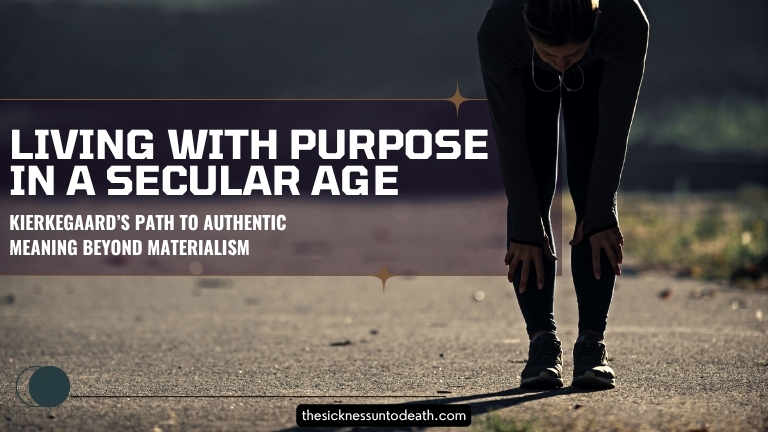In a world increasingly defined by secular values, consumerism, and the relentless pursuit of material success, it’s no wonder many feel a growing sense of emptiness. Despite having more choices, freedoms, and conveniences than ever before, a deep question continues to haunt modern life: What is the purpose of it all?
For Danish philosopher Søren Kierkegaard, this question was central to the human experience. Though he lived in the 19th century, Kierkegaard’s insights into authentic living, despair, and spiritual purpose feel uncannily relevant today. As more people find traditional religion fading into the background of public life, Kierkegaard offers a bold and challenging invitation: to live with authentic purpose, even in a secular age.
The Problem of a Materialist Society
Contemporary culture often equates success with visible wealth, social status, and personal achievement. From social media to advertising, we are constantly encouraged to curate a life that looks meaningful—luxury lifestyles, aesthetic routines, and productivity hacks dominate the public imagination.
But Kierkegaard warned that chasing external rewards at the expense of inward reflection leads to what he called “despair”—a state of being alienated from one’s true self. In his view, the more we attach our identity to what is fleeting, the more we risk losing our authentic essence.
“The greatest hazard of all, losing one’s self, can occur very quietly in the world, as if it were nothing at all.” — Søren Kierkegaard
Meaning Beyond the Material
Kierkegaard didn’t believe that material things were inherently bad. Rather, he argued that placing ultimate value in them was a mistake. A truly meaningful life, he insisted, must be anchored in something deeper than possessions or public approval. It must involve a relationship with the eternal—a grounding that gives shape to our decisions, values, and sense of self.
Even in a secular world, this doesn’t necessarily mean returning to organised religion. For Kierkegaard, what matters most is cultivating a life of inner integrity—choosing values that are enduring and living in accordance with them, even when it’s difficult or unpopular.
The Call to Authentic Living
Kierkegaard’s philosophy challenges us to examine how we live and why. Are we making choices because they are truly ours, or because they are expected of us? Are we living by design or merely by default?
Living with purpose, in his framework, means:
- Rejecting the crowd: Not blindly following trends or public opinion.
- Facing the self: Confronting uncomfortable truths about who we are.
- Choosing with intention: Making decisions aligned with deeper convictions.
- Engaging the eternal: Seeking connection with what transcends the everyday.
This kind of living requires courage, but it leads to what Kierkegaard called “becoming a self”—a person who is truly whole, inwardly free, and spiritually grounded.
Relevance in a Secular Age
Today’s society offers countless distractions—streaming services, endless scrolling, curated perfection. Yet many are waking up to the fact that more options do not equal more meaning. As people seek alternatives to shallow consumerism, Kierkegaard’s writings provide a radical and refreshing roadmap.
You don’t need to be religious to benefit from his work. What you need is a willingness to look inward, to question the status quo, and to pursue a life that aligns with your truest values.
Final Thoughts: Choosing Purpose Over Performance
In a secular, success-driven age, living with purpose often means swimming against the tide. But Kierkegaard reminds us that the cost of not doing so is far greater: losing ourselves in the process.
True meaning isn’t found in the noise—it’s found in the silence of reflection, in the quiet decision to live authentically, and in the courage to be yourself.
Ready to explore Kierkegaard’s insights further?
Don’t forget to check out The Sickness Unto Death: A Modern Translation for the 21st Century—available now at www.thesicknessuntodeath.com. A powerful exploration of despair, identity, and what it truly means to be yourself.

